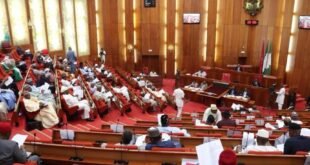Dr. Uche Nwokwu, coordinator of the National Cancer Control Program (NCCP), Ministry of Health and Social Wellness, says that large breast men have a greater risk of developing breast cancer.
Nwokwu revealed it in an interview with our corresponding Saturday in Abuja.
He said that men subjected to hormonal therapy to alter their body physiology to appear more feminine are also at high risk.
He explained that, since men had breast tissue, they could develop breast cancer, although the condition was rare.
Confirming that such cases had been recorded in Nigeria, the NCCP coordinator underlined the need for awareness.
According to him, breast development in men can be triggered by an increase in estrogen, the hormone responsible for breast growth, in particular when testosterone levels decrease.
He said: “The hormone that women have that makes their breasts develop is also present in men.
“The difference is that testosterone, which is higher in men, suppresses that hormone; therefore, when there is an imbalance between the two, depending on what higher it tends to manifest more.”
He added that when the levels of estrogen in men become dominant, he could lead to gynecomastia (the enlargement of the male breast tissue) which in turn increases the risk of breast cancer.
“Once there is a fluctuation that interrupts the body’s ability to regulate cellular ducts, it can trigger breast cancer,” he said.
Nwokwu observed that breast cancer risk factors in men are similar to those of women.
However, he said that women were more prone because of their more developed and cellular conduct tissues.
He said that men with bigger breasts face a higher risk than those with medium -sized breast dimensions, although no man was completely exonerated.
“The reason is simple, everything that lowers male hormones, both due to diseases or environmental factors, can cause an increase in female hormones.
“This imbalance can cause gynecomastia and, by extension, increase the risk of breast cancer,” he said.
He also identified genetics as a significant factor, stating that “people who come from families with a genetic predisposition must be cautious, since even slight environmental triggers can raise their risk”.
The coordinator also warned that even men who suffer hormonal therapy in attempts to move on to a female body structure are increased risk.
“When men take hormonal therapies to alter their physiology, the most active female hormones can expose them to a greater risk of breast cancer,” he said.
On the available data, Nwokwu said that the figures are partly low because men often do not recognize the symptoms of breast cancer until they receive a correct diagnosis.
He recognized the lack of final data on the disease in men, stating that he reflected a wider challenge in the collection of cancer data.
However, the NCCP coordinator observed that the Federal Government had designated cancer as a disease to be reported to improve data collection.
He added that efforts were underway to improve diagnostic capacity at national level, so that any anomaly found in the body could be identified and diagnosed carefully.
To reduce the risk of breast cancer, Nwokwu recommended men to regularly control their bodies for unusual lumps or growths, especially in the breast area.
“Any abnormal growth should be correctly studied. The fabric samples should be taken for laboratory diagnosis,” he recommended.
 JamzNG Latest News, Gist, Entertainment in Nigeria
JamzNG Latest News, Gist, Entertainment in Nigeria









